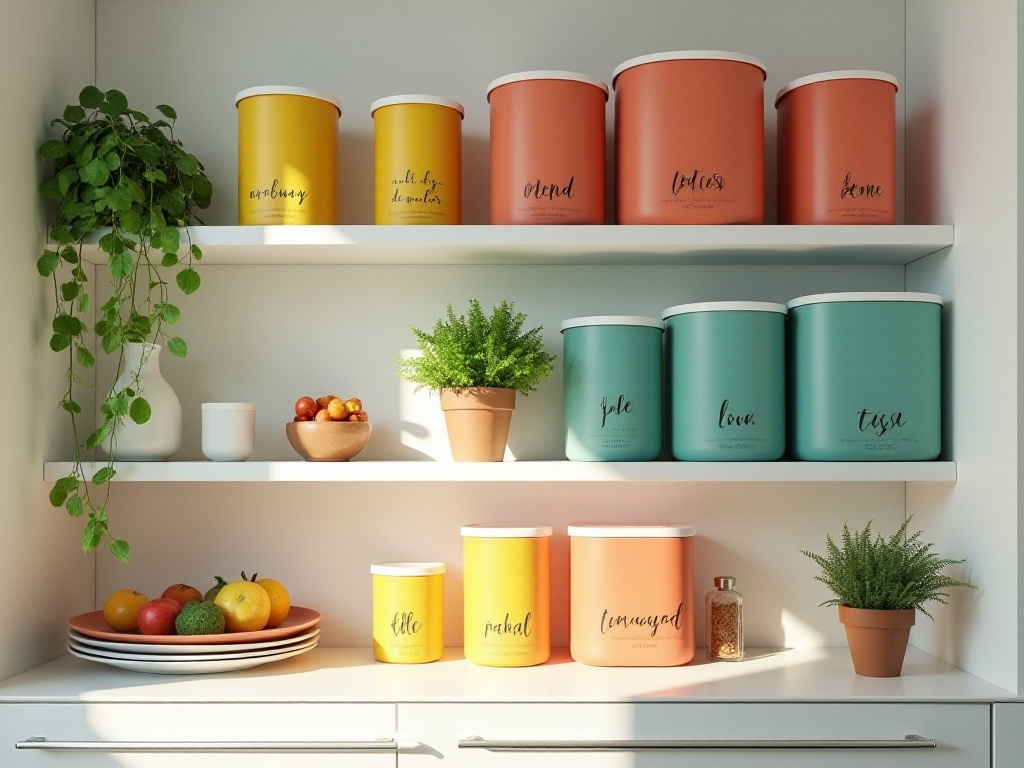Key Troubles
The scene of frantically searching for keys in the entryway when rushing to work in the morning is all too real! I believe many people have experienced the embarrassment of being late because they couldn't find the right key. Especially when you're holding several sets of keys, each with five or six different-sized keys, the anxiety can drive you crazy. Most frustrating of all is when you rarely use certain keys, and when you need them, you can't remember which lock they open, forcing you to try them one by one in a flustered state.
In our lives, keys are among the most important yet easily overlooked small items. They may seem insignificant, but once there's a problem, they seriously affect our daily life. Imagine coming home after a long day's work, dragging your tired body, only to find your keys are missing - that feeling is utterly desperate. Or, when you finally schedule a meeting with an important client, but end up fumbling for your office keys at the bottom of the building - these situations make you want to disappear into thin air.
Nail Polish Magic
Honestly, when I first heard about using nail polish to mark keys, I thought it was a bit unreliable. But after trying it, I discovered it was a genius idea! First, nail polish comes in so many varieties, from basic red, orange, yellow, green, blue, and purple to glitter and gradient colors - everything you need to mark different keys. Plus, nail polish dries quickly and adheres strongly, lasting especially long on keys.
The actual process is quite simple - you can design your color scheme according to your preferences. For example, I use bright red to mark my front door key since it's the most frequently used; sky blue for office keys, giving a fresh and professional feel; gold for storage locker keys, looking particularly high-end; and pink for my parents' house keys, giving a warm and intimate feeling. If you're worried a single color isn't eye-catching enough, you can try drawing simple patterns like stars, dots, or stripes on the keys.
The biggest advantage of this method is that even in poor lighting conditions, you can quickly find the key you need by feeling the different textures. Moreover, nail polish is very affordable - one bottle can mark many keys, making it highly cost-effective. However, remember to choose a well-ventilated place when applying nail polish to avoid inhaling too many fumes. Also, it's recommended to choose good quality nail polish to ensure the marking's durability.
Storage Ideas
Speaking of the bread clip labeling method, it's truly a brilliant idea. These ubiquitous bread clips are not only lightweight and durable but also provide ample writing space. You can write detailed descriptions of the key's purpose, such as "3rd Floor Storage" or "Underground Parking Area B." If you're worried about the writing wearing off, you can cover it with clear tape.
Besides bread clips, I've discovered many creative storage methods. For instance, you can use different colored key covers to distinguish keys - these silicone key covers not only protect the keys but also make the key ring look neater and more attractive. Or you could purchase a key organizer with labels - these organizers usually have multiple hooks, each with replaceable labels, making it convenient to store different keys by category.
For those who regularly carry multiple sets of keys, consider using a multi-layer key case. These key cases typically have several separate compartments, allowing you to store keys for different occasions separately. For example, work keys in one layer and personal keys in another, preventing mix-ups. Some key cases even include card holder functions, accommodating access cards and transit cards - truly practical.
Fixed Habits
Developing good key management habits is easier said than done, but once formed, it makes life much easier. First, choosing a fixed location for keys at home is very important. This location should be visible right when you enter, such as key hooks by the entrance, a shelf near the door, or a storage box on top of the shoe cabinet.
I recommend choosing a location that's both convenient to access but not easily bumped into. For instance, if you have children or pets, it's best to keep keys where they can't reach them. Also, the location should be away from windows or areas prone to water to prevent keys from getting rusty.
Establishing fixed habits also includes a daily ritual of checking if you have all your keys. You can make a simple checklist before leaving: house keys, car keys, office keys, etc., and verify each one. It might seem troublesome at first, but after persisting for a while, it becomes natural.
If you often share keys with family members, consider setting up a dedicated key management station at home. It could be a small blackboard noting who took which key and when they expect to return it. This helps avoid unnecessary conflicts between family members over missing keys.
Smart Management
Modern technology has brought revolutionary changes to key management. There are various smart key management products on the market, from simple Bluetooth trackers to complex smart lock systems, all making our lives more convenient.
For example, some smart key fobs can locate keys through a mobile app - when you can't find your keys, open the app to see their last known location. Some products even have a reverse finding function - when you can't find your phone, you can press the key fob to make your phone sound an alarm. This feature is a blessing for forgetful people!
More advanced smart lock systems can completely free you from traditional keys. These systems usually support multiple unlocking methods, including passwords, fingerprints, and remote unlocking via mobile apps. Although relatively expensive, considering the lifespan and convenience, it's actually a worthwhile investment.
However, when choosing smart products, note a few points: first, consider the product's security - choosing well-known brands provides better assurance; second, consider battery life - some products may need frequent charging; finally, consider water resistance, as keys often face rain exposure.
Backup Plans
As the saying goes, "Better safe than sorry," this especially applies to key management. Preparing spare keys is not just a precautionary measure but a life wisdom. It's recommended to prepare at least two sets of spare keys - one kept with a trusted friend or relative, and another hidden in a concealed compartment of your everyday bag.
Choosing who keeps your spare keys is important - preferably someone who lives nearby and maintains regular contact. When giving them spare keys, clearly explain which locks they open and under what circumstances to use them. Also respect their privacy and don't disturb them unnecessarily.
For shared apartments, it's advisable to exchange spare keys with roommates. This way, if someone accidentally locks their keys in their room, it can be quickly resolved. However, remember to collect or replace all spare keys when moving or changing locks.
Besides physical spare keys, there are now 24-hour locksmith services - you can save their contact information in your phone for emergencies. But be sure to choose legitimate locksmith companies, preferably booking through official channels to avoid encountering criminals.
Daily Maintenance
Although key maintenance is simple, it's often overlooked. Actually, just spending a little time on maintenance can greatly extend the life of your keys. First, regular maintenance with professional key lubricant is important. Lubricant reduces friction between the key and lock cylinder, making unlocking smoother while preventing rust.
When using lubricant, be careful not to use too much - excess lubricant can attract dust and affect key usage. It's recommended to first wipe the key with a clean cloth to remove surface dust, then evenly apply a thin layer of lubricant. This is especially important in rainy seasons or humid environments like coastal areas, where rust prevention is crucial.
If you notice slight deformation or notches in a key, it's advisable to get a new copy made at a locksmith rather than forcing use of the deformed key, which could damage the lock cylinder. Also, maintain the key ring, regularly checking for looseness or risk of breakage, and replace deformed key rings when needed.
When carrying keys, try to avoid placing them with other metal objects like coins or keys to reduce surface wear. If you frequently use keys outdoors, consider adding protective covers - this protects both the keys and prevents them from scratching other items in your bag.
Safety Advice
In key management, security is always paramount. Many people have the habit of marking detailed addresses on their keys, which is actually very dangerous. If keys are lost, those with address information can easily be exploited by criminals. The correct approach is to use codes or symbols that only you understand to mark keys.
Equally important is not keeping keys with items that show address information, such as letters, bills, or documents with addresses. Also be careful on social media - don't casually post photos of keys, especially those clearly showing the key's teeth pattern, as technology now exists to copy keys from photos.
If using smart keys or electronic access cards, pay special attention to information security. Regularly change passwords, avoid setting simple combinations like birthdays or phone numbers that are easy to guess. When using smart lock apps, also mind account security, preferably enabling two-factor authentication.
For situations requiring temporary key handover, such as to cleaning staff or maintenance workers, it's recommended to use temporary keys or one-time passwords rather than giving out regularly used keys. This ensures work proceeds smoothly while maintaining home security.
Emergency Handling
Even with thorough preventive measures, key loss can still occur. The most important thing then is to stay calm and follow these steps: First, carefully recall when and where you last used the keys, trying to recreate the scene. If lost in a public place, immediately contact the lost and found office.
If you're certain the keys can't be recovered, take immediate security measures. For house keys, the safest approach is to replace the lock cylinder. Although this incurs some expense, it's worth it for security. If company keys are lost, immediately report to relevant supervisors for the company to decide whether lock replacement is needed.
While replacing locks, also remember to update all spare keys. If the lost keys included other items like car keys or locker keys, take corresponding precautions. This might include replacing car locks, changing lockers, etc.
To avoid similar situations in the future, consider insuring important keys. Some insurance companies now offer key loss insurance - although the cost is low, it can reimburse part of the expense if lock replacement is needed.
Experience Sharing
As someone who used to be very forgetful, I deeply appreciate the convenience of good key management. For example, I now check the keys I'll need the next day before bed, placing them in a fixed location. In the morning, I can just grab them and go, without frantically searching everywhere.
Additionally, I've developed a habit of regularly organizing keys. Periodically, I check for unused keys and promptly categorize or dispose of them. This not only reduces the weight of the key ring but also prevents useless keys from taking up space.
Regarding smart products, my advice is to progress gradually. You can start with simple smart key fobs and consider switching to smart locks after becoming familiar. After all, these products require some learning curve, and going all-in might feel overwhelming.
Data Support
Survey data shows that among 1,000 office workers, over 80% admit to being unable to find their keys at least once per week. On average, each person spends 15 minutes per week looking for keys, amounting to 13 hours annually. That's equivalent to watching 6 movies or reading 2 books.
More concerning is that about 30% of respondents report being late due to lost keys. This not only affects work efficiency but may also create an unreliable impression. Among these people, over half indicate they would immediately change their situation if they had a good key management solution.
From an economic perspective, the losses from lost keys are significant. Statistics show that replacing locks for an average household costs between 200-1000 yuan, potentially more for smart locks. This doesn't include possible property losses and mental distress.
Friendly Reminder
Developing good key management habits indeed requires time and patience, but once established, the convenience far exceeds expectations. Start with the simplest things, like fixing a key storage location, then gradually try other methods. Remember, there's no one-size-fits-all solution - the most important thing is finding what works for you.
When implementing these methods, also consider local conditions. For instance, if you live in a humid area, you might need to focus more on rust prevention; if you often share keys with others, establishing a shared management system becomes particularly important.
Finally, hope everyone can find their most suitable key management method, making life easier and more enjoyable. After all, rather than wasting time looking for keys, it's better to spend that time doing more meaningful things.




